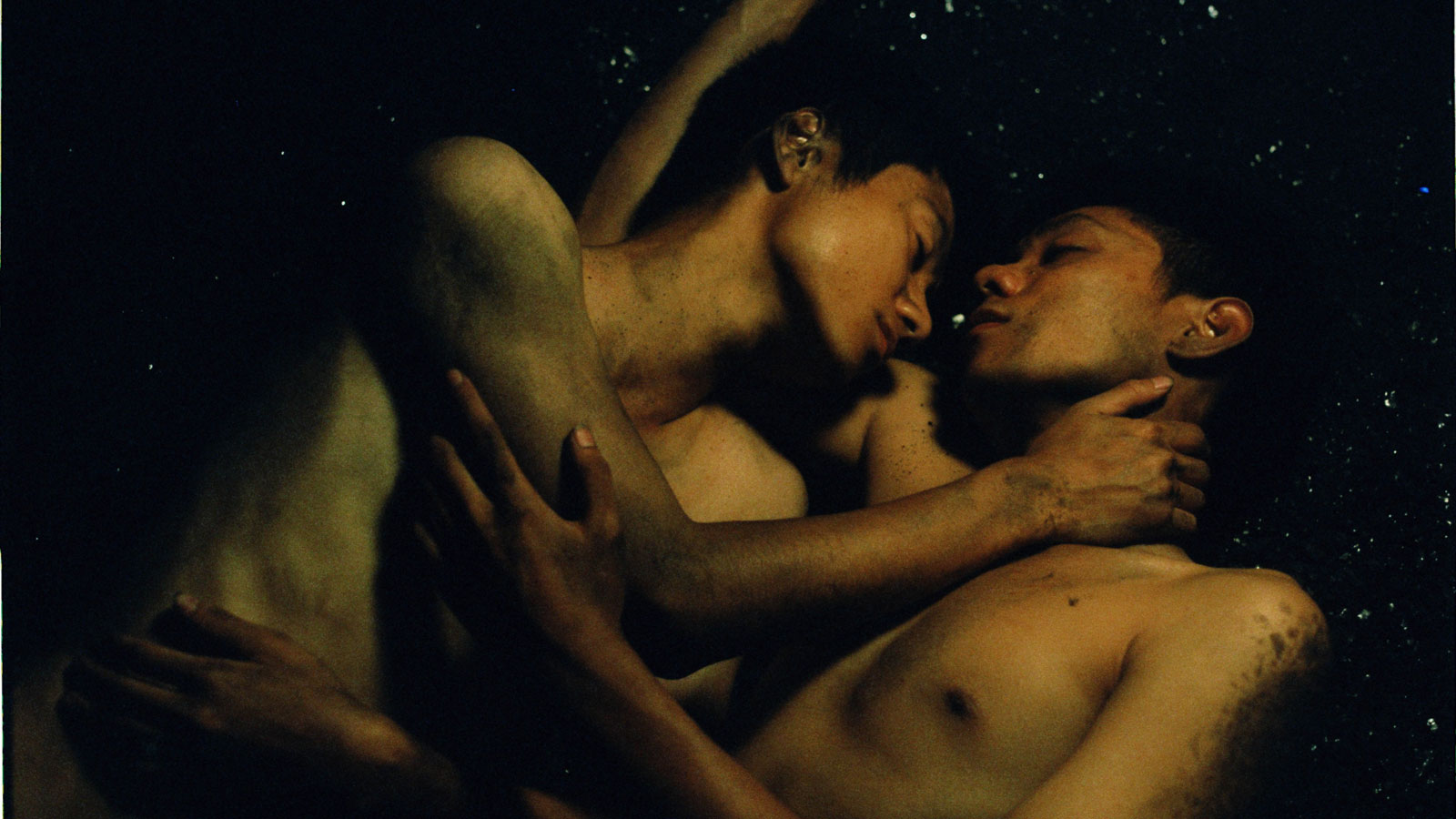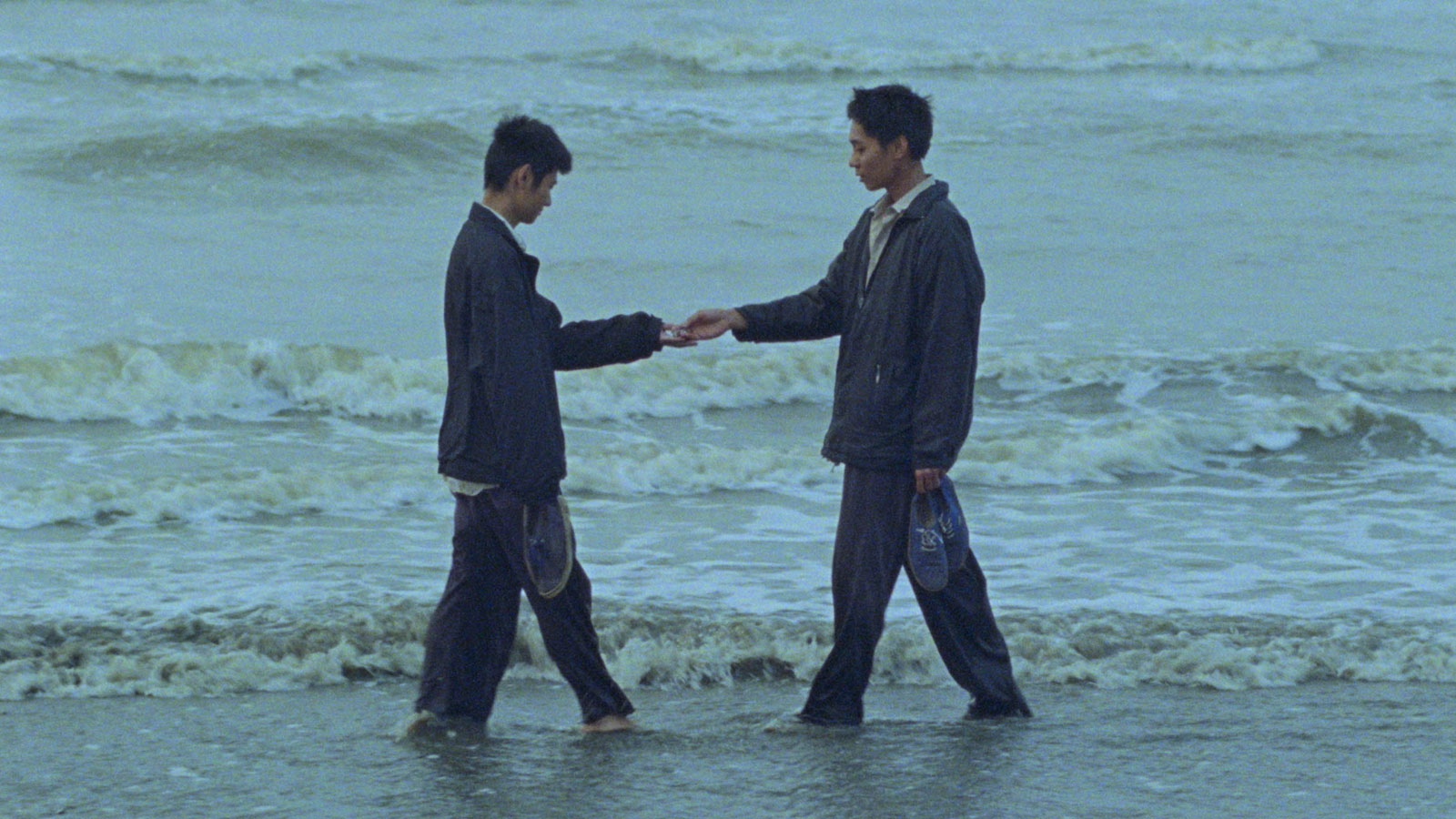Tropical Reveries: The Lyrical Intimacies of Viet and Nam

Critics Campus 2024 participant Nicole Cadelina explores the textures and spaces of Trương Minh Quý’s poetic excavation of queer romance and memory.
I stand in the ocean and cradle
the loss of us. Here is the gash that tears wider
as you tell its story. The people drink in the water burial
then rise, light as before.
– Eunice Andrada, ‘a series of half-truths about drowning’
Emerging from the nocturnal abyss, a young man is born from the darkness – a cavernous and cosmic vacuum. This figure appears as alien as the stuff of dust that rains from above. His breathing is laboured and hoarse, exhausting himself as he carries another man in his arms. Only the dripping sound of water accompanies these men in this struggle. The fragile light contours their bodies into painterly existence, their skin gleaming.
This is the prelude to Trương Minh Quý’s Viet and Nam: a story of two gay miners whose romance is complicated above ground. Although the film title refers to the characters’ names, neither man is identified as Viet or Nam outside of the closing credits. To put a name to them is to place a limit to their existence; it matters more to us that these bodies do not abandon one another.
This opening to Trương’s film unravels the lucid poetics of post-war memory – one that refuses a straightforward account of the Vietnam War, and instead follows the associative logic of sensations and reveries within the country. A television broadcast orientates this story in the aftermath of 9/11, though Trương rejects this temporal anchor point in favour of a looser timeline. The man credited as Nam (Phąm Thanh Hài) dreams of a new life in Europe and pursues the search for the body of his father, who died in combat during the war. This looseness of time and space is especially articulated through Nam’s mother (Nguyễn Thị Nga), who helps her son look for his father’s body through dream and intuition.
The lyricism of this first scene extends through the intimacies of the couple. In Viet and Nam, queerness exists in quietude: underground mines become an unexpected site of homoeroticism, a borderless terrain in which time and space appear obsolete to these men. The limitless space allows Nam and the man credited as Viet (Đào Duy Bào Đįnh) to make love passionately atop a bed of coal; one of them pierces his genitals on the coarse surfaces, and his partner wipes a streak of blood onto the injured man’s stomach. Neither of them appears bothered by this.
Life in the mines is as debilitating as it is empty, seemingly at once intimate and damaging. The coexistence of danger and desire is akin to poet Mark Doty’s concept of lyric time, an “interior landscape of reverie” in which a story is “seized by a moment that suddenly seems edgeless, unbounded”.

Viet and Nam
Queerness, then, allows subjects to enter an unlimited, immortalised space of tenderness and intimacy – love and desire can hardly be obsolete in a place as destructive and polluted as the underground mines. To engage in reverie is, for these characters, to take liberties in their perceived existence, even at the level of transcending beyond the labels of their names.
It is not until we reach above ground that lyric time becomes more apparent through Viet and Nam’s poetics of water. Rivers, oceans and puddles form a contemplative conduit for memory and thought, however fluid or lucid. In one scene, Nam’s mother sings ‘Con cò’, a lullaby about a mother stork who desires to be cooked with clear as opposed to murky water, so as not to “break [her] little ones’ hearts”. We witness this lullaby between two shots: the first, a close-up of the men sleeping in each other’s arms; and the second, a shot that hovers across tropical ocean. Water continues the legacy of the vacuous mines, priding itself on being a continuum of reverie – and, like a lullaby, it sedates us into the stuff of dream, childhood and wonderment.
As the film journeys into forests that whisper with sounds of wildlife, water transforms into images of elegy and lamentation. At a riverbank, a father recalls a comrade who survived a bullet wound, just after the landscape is illuminated by sunlight – a minute later, we encounter an image of a fallen soldier in the rain, heightened by a crescendo of droning locusts. In a later scene, Nam follows a frog down into a cave. He stands in front of it, reflecting on the possibility of reconciliation with his deceased father. The water leads to a perpetual darkness – a return to the underground, and a return to the borderless time and space. In attempting to resurrect the past into the present by imagining his father’s final moments, Nam can only speculate about an alternative temporal space.
Although water in Viet and Nam carries implications of contemplation, it transforms into a source of destruction. Nature, after all, is unforgiving in its principles. As much as water has been a conduit for memory, passageways and revelation, it is also a fluid site of memorial, burial and distance. We witness this near the end of the film as a house is drowned in violent floods of rain and a mother trudges through her home, waist-deep.
It is thus, too, in the film’s hopeless coda, wherein the two men remain oblivious to their water burials. In their fraught efforts to find an infinite, unbounded space, their only way out is to resign to the limits of time. All that is certain now is a quiet death – and the stuff of childhood reveries to draw comfort from in the midst of quiet suffering. Nostalgia is activated within arm’s reach as a verbal token of safety and comfort – a final prayer to the continuum of water.
This image of devastation is reminiscent of the water poetics of poet Eunice Andrada: a “gash that tears wider” as we retell this story, but one that also exalts both the living and the dead.